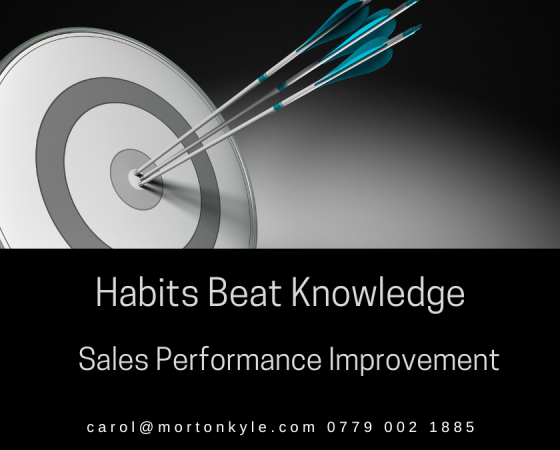Sales Performance Improvement – Habits Beat Knowledge Every Single Time
Sales Performance Improvement is what happens once you identify what skills and actions are needed to systematically deployed every single day.
Continuous sales improvement, incremental uplifts in sales key performance indicators by design….because the right people are doing the right thing, at the right time, with the right intention.
Sales performance improvement happens when habits are embedded.
Habits that are designed and proven to move the sales needle.
It’s not
- Random.
- Ad-hoc.
- Without thought
It’s based on measurment, iteration, idealtion, adoption and ongoing testing.
But you know what kills many sales improvement plans?
Too many brilliant sales performance improvement plans fall by the wayside BECAUSE he key people involved forget that it’s not about what they KNOW and it’s all about what they DO!
And that absolute mindset is the reason why your sales improvement won’t be as:
- Fast as it could be,
- Effective as it could be
- Sustainable as it could be
And why it might well fail before you get out the blocks!
Sales Improvement Should be Business as Usual…Right?
If you’re in sales, sales management or running your own business then chances are you’ll be looking for ways to continually boost your sales performance
You’ll be looking for
- More customers
- More profitable clients
- In less time
- Bigger orders
- Larger average order values
- Higher conversions
- Higher margins
- More referrals,
That’s business….you should be looking for these things…because if you’re only standing still, chances are the race is being run around you!
Sales is a competitive space, and it’s good business practice (and human nature) to ask…is this the best we can do?
Continuous Sales Improvement – Habits Beat Knowledge
Here’s the truth about seeking continuous sales performance improvement
”Once a certain level of skill, knowledge and competence is acquired, then driving Continuous Sales Performance Improvement has more to do with changing habits than increasing knowledge and skills”
You see, if you’ve been in a sales or sales leadership role for any time, you’ll most likely know everything there is to know and that you need to know…and your performance will reflect that.
(If you’re relatively new and you want to see just what’s going on in the sales function then check out the Morton Kyle Sales Insight Audit)

The Unseen Sales Gap
I’ve sat in enough sales board meeting and been neck deep in the sales function, and there is no doubt that, in the main, what happens in the sales function is rerely a real or tgrue reflection of what the business ‘thinks’ it’s doing.
It’s the Unseen Sales Gap
That t gap between what you KNOW and what you DO?
What could possibly happen if you could close that gap?
The Sales Checklist
In his book – The Checklist Manifesto – Atul Gawande strongly, and with good reason once you read his research, advocates the use of extensive check-lists to improve performance.
Sales Performance Improvement works the same way…a good and well designed check-list ensures the gap between what you KNOW and what you DO is as small as possible
Gawande’s background is in medicine. Having piloted and then rolled out his check-list based methodology across many hospitals and medical facilities he details how a simple check-list has saved 100’s of thousands of lives….
There are some brilliant examples of the gaps that exist between what we know and what we do.
Gawande presented something especially interesting around the difference in the number of times surgeons said they washed their hands (and when) versus how many times they actually washed their hands (and when). This stuff saves lives!
He proposes, whatever your field of expertise, in adopting a checklist mentality, because the same methodology can be transferred to other industries – and I for one, strongly agree with him.
In truth, anything that saves that number of lives has to be worth a good look at.
You’ll feel the same when you read his evidence.
Simply put, if a humble check-list can save that many lives…
what could the same do for your business, your sales performance and your sales results?
Worth a look?
So This Relates to Sales Performance Improvement How?
Here’s the premise:
Maybe you think no-one needs a checklist for the simple stuff, where there are few variables, when the outcome is low risk, it’s a predictable action with a predictable outcome…
But that doesn’t mean there shouldn’t be one…perhaps for new starters, audit, quality control, analysing what works or what went wrong when it doesn’t work…
But, that aside…
Checklists have a distinct advantage in those situations where there is a higher level of complexity, more risk, a handful of variables, a few minefields and no guaranteed outcome.
This is the first and last time you’ll see me compare sales to heart surgery but there you go.
You’ll see where I’m going with this…
In both, the risks are high, lots of complexity, variables, high levels of unpredictability, opportunity for errors and failure are all present, people are involved so that’s a whole different level of complexity and risk
So whilst we’re not talking about losing lives, we are risking something. Maybe losing margin, turnover, market share, customer confidence, shareholder confidence, brand value.
Digging deeper, Gawande makes the distinction between two types of error:
Ignorance – mistakes we make because we don’t know enough.
Ineptitude – mistakes we make because we don’t use the skills and knowledge we have in the right way.
He concludes that most errors happen because of the latter – ineptitude.
This suggests that the person actually knows ALL they need to know, they have ALL the skills they need to know.
So, the gap is not in the KNOWING, it’s in the DOING…or NOT DOING.
Moreover, this ineptitude exists in simple and complex tasks.
Let me explain, the problems occur when old habits, entrenched ways of working, when the ‘that’s how we’ve always done it’ mindsets overtake the conscious.
Or when the body/mind is on auto pilot.
Almost like conscious competence, but not quite as competent as one imagines.
That’s a perfect breeding ground for errors to take place.
For example, the patient has complications or the sale derails unexpectedly, it’s often simply because of lack of good habits, rather than lack of skills, knowledge or competence.
This is where the Sales Performance Improvement Checklist comes into it’s own.
It’s a check-list to use.
A list to refer to when the sales process with a client is going off track.
It’s literally a step by step guide in what to do to rescue it, bring it back on track, get it motoring in the right direction.
How simple is that?
Here’s an example:
In his book, as I alluded to above, Gawande uses examples of Dr’s and medical staff not washing their hands as frequently as they should.
Or as frequently as they thought they did!
Pay attention to that last statement. It’s very important because how many times do we think we’ve done something when actually we haven’t?
Especially those repetitive tasks, the small tasks that matter, but don’t really register at the time?
Gawande references the Dr’s failing to ask a simple question of the patient, or washing hands.
It’s the same in a sales environment, it could be remembering to ask the budget question early on, or finding out if this is a price comparison exercise or a genuine need with the client.
These are seemingly inconsequential questions at the time that have a HUGE impact on the quality of the sale and the chances of profitable conversion.
Poor selling habits cost sales!
On a real life basis – if you’ve ever kept a food diary – you know that your ‘good food days’ were more like ‘ok food days’ and your ‘ok food days’ really should be called ‘oh hell! food days’! The power of the checklist in another format!
The power of the checklist in another format!
So, there’s no two ways about it when you’re thinking about sales performance improvement, or even better, continuous sales performance improvement then – Habit Beats Knowledge every time.
Summary: Sales Performance Improvement
Gawande concludes that having and rigorously using checklists improves the chances of success and improves performance across the board.
My take away, is much bigger and more important than simply improving sales performance and here’s why.
Such a checklist based methodology actually changes habits.
That is exciting because if you’re adopting this in your sales team, your business and your customer facing environment you’ve just created your baseline for continuous sales performance improvement…and made onboarding new sales people really easy!
That’s priceless.
One more thing:
If you’re putting this system in place, it dramatically changes the function of your sales manager…or Sales Performance Coach.
Both functions now act as part auditor, part coach, part sales performance improvement specialist…which is how it should be…but more on that another day…
Happy Selling
Carol
07790021885
p.s. Sales Performance Improvement is a key focus on our Sales Improvement Workshop – perfect for sales teams who want to up their selling capabilities, adopt modern selling skills and become more conscious about how they are getting their current sales results so they can bridge the gap to increased conversions, revenue and margins


Who am I?
I’m Carol Griffiths, and I’ve spent the last 30+ years in the trenches of sales—fixing broken pipelines, rebuilding underperforming teams, and helping businesses close more deals at higher margins.
I’ve worked with global brands, challenger firms, and fast-growth sales teams, helping them:
✔ Fix underperforming pipelines – turning ghosted leads into closed deals.
✔ Increase win rates – without discounting or chasing bad-fit prospects.
✔ Build sales systems that actually work – so you don’t waste time on ‘busy work’ that doesn’t convert.
I’m not another ‘sales trainer.’ I don’t teach theory. I fix sales problems – fast. And if you’re still reading, it means you’ve got a problem that needs fixing.
I know how sales leaders think because I’ve been one. I know what the board wants because I’ve sat in those meetings.
And I know what works – because I’ve done it, tested it, and proved it across industries, markets, and economic downturns.

